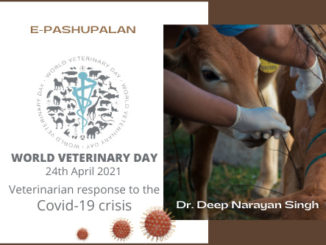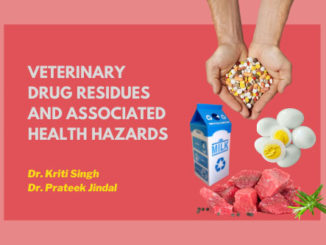Veterinary profession is one of the noble professions that it helps 70% of the population of India living in the rural areas. Animal husbandry plays a very important role in day to day life of rural India. Role of veterinarians has always remained significant in uplifting of the livestock sector and directly or indirectly help the human society. India livestock sector is one of the organized sectors and India stands on very commendable position in the world. India ranks 1st in milk production, 2nd in aquaculture, 3rd in egg production and 4th in broiler chicken production. Veterinary professionals are engaged in various fields such as in dairy, poultry, pharmaceuticals, research development, pet care, feed industry and other allied sectors. Veterinarians are an integral part of the global health community. Beyond the activities linked to the health and welfare of animals, they have a key role in disease prevention and management, including those transmissible to humans and also to ensure food safety. They have always contributed immensely towards the development of livestock and the most particularly towards the rural society. Drastic development has taken place in Indian Animal Husbandry industries in the last few decades and has generated massive employment generation.
India along with whole world have witnessed a global pandemic in year 2020 and still struggling with the aftermath of this disaster. The global economy has suffered a huge thrash and but its impact on the food supply chain and specifically livestock production was unexpected. The immediate impact of Covid-19 was a wave of panic for buying animal products. It is estimated that the sector have incurred huge loss after rumours and fake news of chicken being infected with corona virus which began doing the rounds on social media from mid January. Subsequently with the enforcement of lockdown all over the country, food supply chain is drastically hampered. The pandemic and the associated lockdown have caused enormous distress to the millions of poor and marginal farmers.
Thus to revive back to normal situation, several initiatives have been taken by both central and state Government and veterinarians have played a major role in combating this situation. Several organizations, institutions, companies organized awareness campaign to educate the people regarding Covid-19 transmission pattern, its potency, symptoms of the disease and all the necessary precautionary measures to be taken against the virus. Promotional activities were carried out about the importance of consumption of meat, eggs and other animal produce at times of such pandemic in order to improve the overall immunity. Steps to educate both the producers and consumers about the myths of transmission of the virus through consumption of animal produce are adopted. The lockdown period has been effectively utilized by veterinarians and farmers as precious free time to develop skills. Whereas social media was primarily responsible for creating many misconceptions among consumers, same platform was also fruitful in enlightening with the actual facts. Many veterinary colleges, universities, ICAR institutes, Animal Husbandry department have conducted various training, webinars and successfully able to provide technical services to the people. This pandemic has also paved a new way towards changing the mindset of the consumers. Consumers are now having become more conscious about the products they are consuming, their quality, hygiene and its nutritional importance.
Veterinarians have come forward to help the affected farming community in many ways. Dairy sector was heavily affected during the pandemic and associated lockdown; many co-operative organization have collected the surplus milk and converted to products as it was observed that consumption of milk products such as Paneer, Ghee, Butter have increased manifold as people were consuming more of such products during lockdown at homes. Veterinarians were also providing field services to the needy as vet hospitals and dispensaries were considered as essential services. Dynamic approach and vigorous campaigning related to health awareness have lead to establishment of several startups to provide fresh wholesome meat and meat products. Drastic change in the mindset of consumers and there was inclination towards consumption of frozen processed foods. Different platforms like WhatsApp, Zoom, Microsoft Team, Google Classrooms, Youtube were used for visual trainings, online consultancy, workshops, awareness and these were a boon for the farming community as most of them were unable to attend such trainings leaving their day to day work schedule. Now even rural women can also take advantages and attend such workshop online merely by sitting at their home and develop entrepreneurial skills. Veterinarians can also educate the farming community regarding several schemes offered by government, explain to them in simpler way to understand and implement easily. Veterinarians have used technologies to reach out to the needy and advised them to use technology to market their products. Online market or e-marketing can help the producers to sell their produce and get appropriate price of the products without the involvement of any other middlemen. Moreover veterinarians can encourage producers to focus on the quality of their products along with increasing their production strategy and discourage use of antibiotics, hormones and other adulterants which have direct impact on human health. Veterinarians provide important animal and public disease surveillance to prevent disease outbreaks including zoonotic diseases. They also oversee veterinary services conducted in hospitals, clinics, ambulatory services, zoos etc, in addition they oversee the care of laboratory animals which are critical to research medicines and vaccines including vaccine research against Covid -19.
As the Covid-19 pandemic has put considerable pressure, veterinary services have contributed in various ways towards building a common response to this pandemic. Veterinarians have shown utmost commitment to support the other health workers and address critical needs which were heavily challenged in the current circumstances.






Be the first to comment